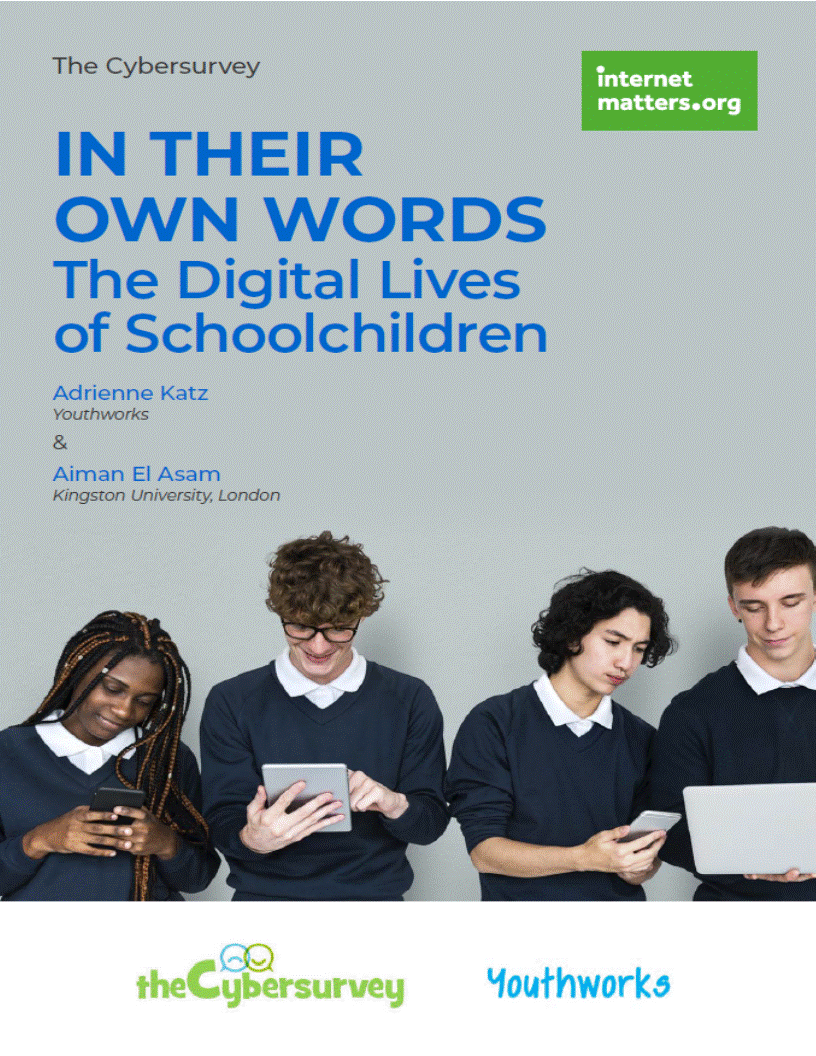Survey messages
Young lives online

Teens say 'Worries affect my life' and 'I can't make my worries go away.' More than half say they're afraid bad things might happen. In their reports of online life, we note a marked rise in teens who are seeing content about self-harm or suicide. Misogyny and misandry are reported this year and teens talk about misinformation, racism, violence and nudes.
Locked Down & Online.
Teenagers' wellbeing & online lives in the COVID winter lockdown 2020/1
As isolation and loneliness hit some teens, others take to the their phones to stay connected to friends. We explore young people's wellbeing and emotional health, and what happened to friendships and access to trusted adults. Also included: changing trends - as cyberbullying falls and harmful content rises. Read how body image and interest in 'bulking up' emerges alongside pro-anorexia content among the harmful online content reported.
Young people's behaviour online is influenced less by online safety rules than about how they feel. It is influenced by emotional needs, pre-existing vulnerabilities and the support they have around them. In this report we hear how the digital environment represents both a refuge and a risk especially to children who need to feel connected because they are isolated, hurt, or vulnerable.
What can adults do in the face of a lack of
trust and teen’s desire for autonomy? In these messages from young people there are urgent trends we cannot ignore.
1.A lack of trust in adults to help effectively when something goes wrong online, and a feeling that parents often don’t understand online life or are too judgemental. 2. A tendency to say that school online safety lessons are not teaching what is relevant and up to date, or what these young consumers say they need.
3. Another strong thread is autonomy. Educators and parents could recognise and support this by helping those who want to find out how to problem solve and stay safe online for themselves.
This report is an overview of the survey messages on all issues covered by The Cybersurveyin 2019.
What motivates a teen to share nudes? By exploring this question with young people, we can learn how to adjust our safety messages, and change how we support a child or teen. We learn that the majority had shared nudes without incident or harm, which makes them sceptical about adults' warnings! The report dispels some myths about sexting and offers hard to hear truths about those who are struggling already and the likelihood that they will be under greatest pressure to share nudes. These challenging messages from young people need to be heard and acted upon.
Report


A lively chat with Vicki Shotbolt of Parentzone
A 'Wednesday Wisdom' article for Tooled Up Education
explores the situation for parents and educators as debates rage about smartphone or social media bans without reliable evidence of benefits or risks bans might bring.
https://lnkd.in/eVm45ZdG
Publications informed by The Cybersurvey
Book Chapter: Young People's Digital Wellbeing: Optimising the Potential and Minimising the Risks. Cathy Street, Aiman El Asam and Adrienne Katz.
In Young People: Socialising and Digitalisation 2021, The Council of Europe and European Union Youth Partnership.
From The Cybersurvey
Cyberbullying Briefing issued November 2020
The latest trends in cyberbullying
Academic Research
Vulnerable Young People and Their Experience of Online Risk
Aiman el Asam & Adrienne Katz
Journal of Human- Computer Interaction.
https://doi.org/10.1080/07370024.2018.1437544
Aiman El-Asam, Adrienne Katz, Cathy Street, Maria Livanou .
Children and Youth Services Review. (Online Dec 2020 and in print March 2021) https://doi.org/10.1016/j.childyouth.2020.105872
Aiman El Asam, Rebecca Lane, Kelli Pearson and Adrienne Katz. Information, Communication and Society
https://doi.org/10.1080/1369118X.2021.1991976
Aiman El Asam Rebecca Lane and Adrienne Katz. Frontiers in Education. 2022
https://doi.org/10.3389/feduc.2022.772051
- Aiman El-Asam, Lara Colley-Chahal, and adrienne Katz, 2023
https://www.mdpi.com/2673-995X/3/2/44
These are papers in a programme of research titled “Vulnerability, Online Lives and Mental Health: Towards a New Practice Model” with financial support from the Nurture Network (eNurture) and UK Research and Innovation (Research Council Grant Ref: ES/S004467/1
Blog
for LSE: Parenting For A Digital Future
Vulnerable offline and at risk online
Blog
Look at Me; Teen Sexting and Risks
Podcast for SWGfl. We talk about The Cybersurvey and messages from it.
Reports from the Cybersurvey
2023 Fun, Friends, Fears and Fallacies
2023 Real or Fake?
2020 Locked Down & Online
2019 A series of reports based on this large dataset
2017/18 Cybersurvey Suffolk
2017/18 Young People With SEN in Mainstream schools
2016/17 Cybersurvey1 Dudley
2016/17 Cybersurvey2 Suffolk
2016 Briefing paper: Online experiences of young people with SEN compared to peers
2015 Briefing paper: Teens & Sexting
2015 Cybersurvey Suffolk
2015 Cybersurvey Nottinghamshire
2014 Cybersurvey Dudley
2014 Cybersurvey Suffolk
Contact us for earlier reports from 2008
Birmingham, Solihull, Oxfordshire, Essex, West of England, Nottinghamshire

Help vulnerable children - our latest research shows who is most at risk.
Base your practice on evidence not media panics!

Explore young people's views. Is your work effective? Gain insights to inform your staff training.








